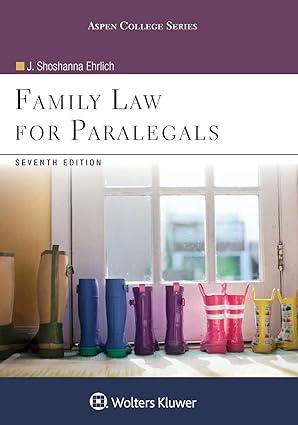Plaintiff avers that in October of 1964 she and defendant entered into an oral agreement that while
Question:
Plaintiff avers that in October of 1964 she and defendant "entered into an oral agreement" that while "the parties lived together they would combine their efforts and earnings and would share equally any and all property accumulated as a result of their efforts whether individual or combined." Furthermore, they agreed to "hold themselves out to the general public as husband and wife" and that "plaintiff would further render her services as a companion, homemaker, housekeeper and cook to ... defendant. Shortly thereafter plaintiff agreed to "give up her lucrative career as an entertainer [and] singer" in order to "devote her full time to defendant ... as a companion, homemaker, housekeeper and cook"; in return defendant agreed to "provide for all of plaintiff's financial support and needs for the rest of her life. Plaintiff alleges that she lived with defendant from October of 1964 through May of 1970 and fulfilled her obligations under the agreement. During this period the parties as a result of their efforts and earnings acquired in defendant's name substantial real and personal property. In the case before us plaintiff, basing her cause of action in contract .maintains that the trial court erred in denying her a trial on the merits of her contention. Although that court did not specify the ground for its conclusion that plaintiff's contractual allegations stated no cause of action. Defendant first and principally relies on the contention that the alleged contract is so closely related to the supposed "immoral" character of the relationship between plaintiff and himself that the enforcement of the contract would violate public policy. He points to cases asserting that a contract between nonmarital partners is unenforceable if it is "involved in" an illicit relationship. A review of the numerous California decisions concerning contracts between nonmarital partners, however, reveals that the courts have not employed such broad and uncertain standards to strike down contracts. The decisions instead disclose a narrower and more precise standard: a contract between nonmarital partners is unenforceable only to the extent that it explicitly rests upon the immoral and illicit consideration of meretricious sexual services....
Questions:
1. What was the oral agreement between the plaintiff and the defendant?
2. Why did the defendant claim that any contract entered into by him and the plaintiff would violate public policy? How does the court respond to his argument?
3. What does the court decide about the enforceability of agreements between unmarried couples regarding their economic affairs? What consideration is to be given to the sexual nature of the relationship?
4. The Marvin court discusses an earlier decision, In re Marriage of Cary. What did Cary hold? Why does the Marvin court reject that decision?
5. How does the Marvin court address the concern that granting rights to unmarried cohabitants will undermine the institution of marriage?
6. What role do moral considerations play in the decision?
Step by Step Answer:






